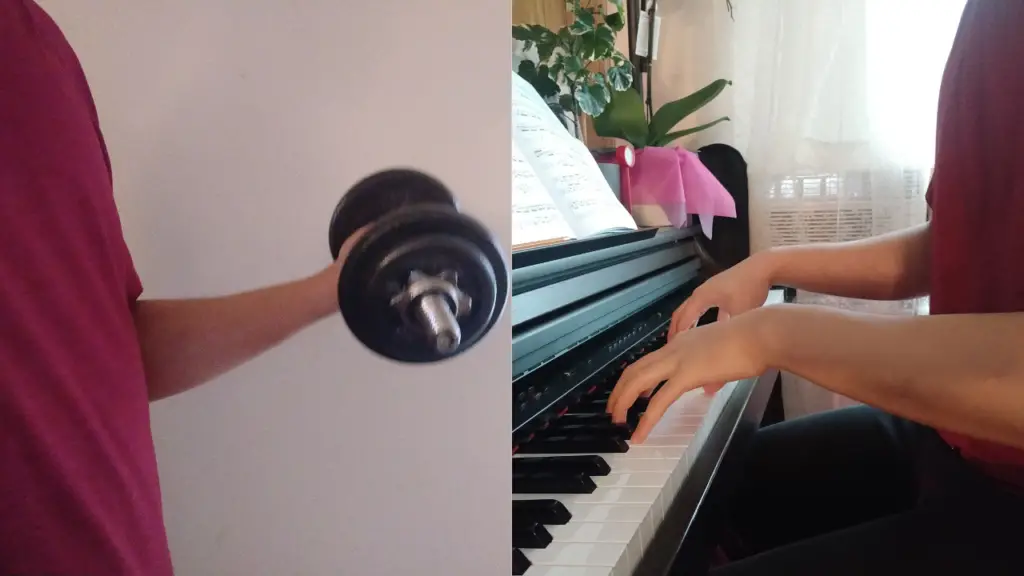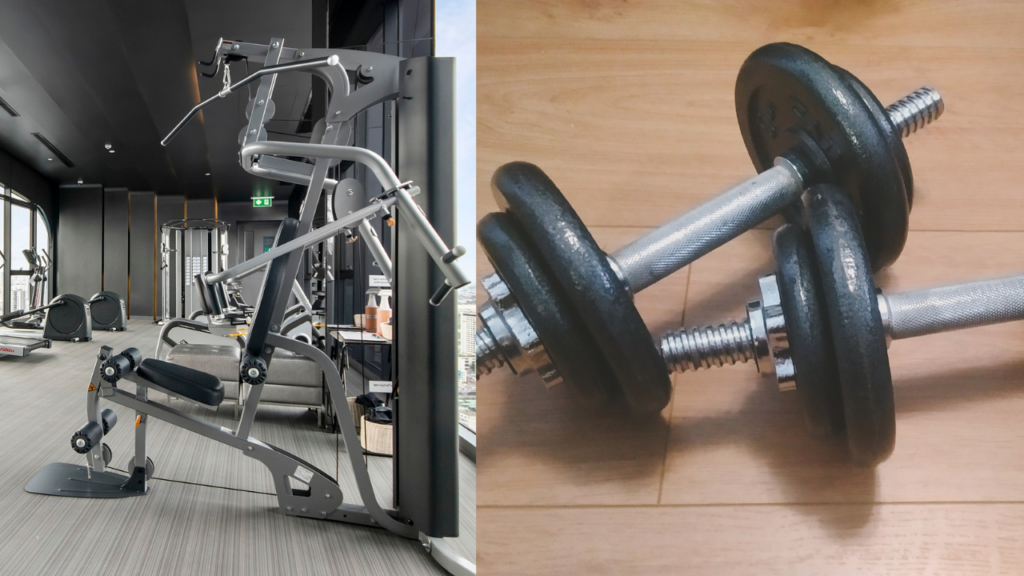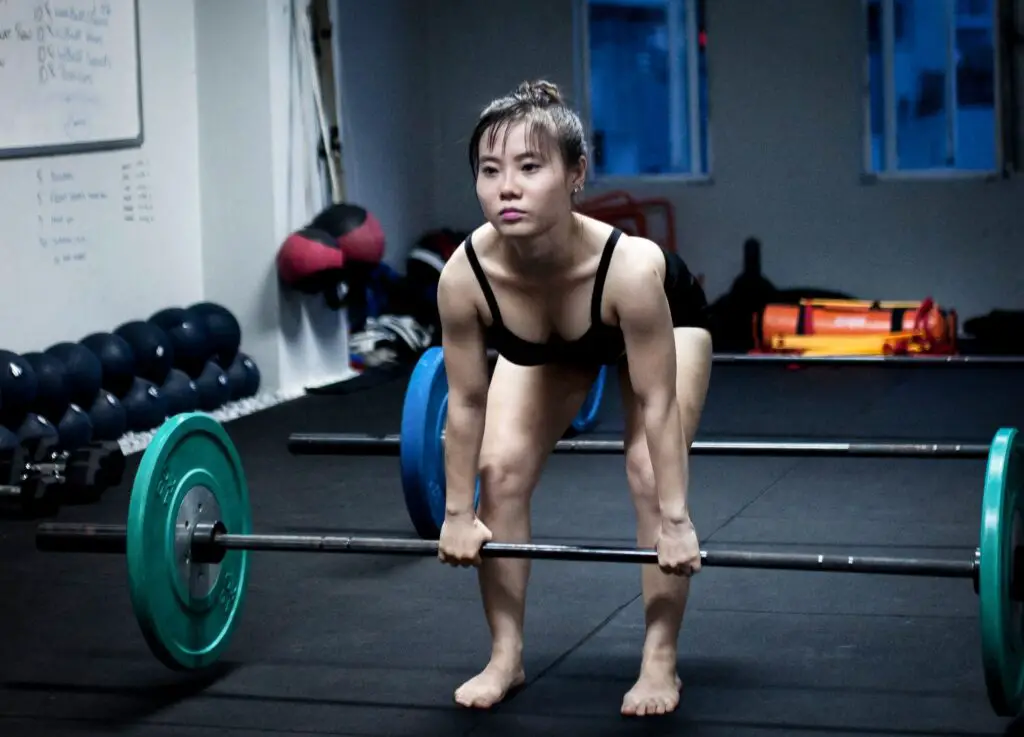This post contains affiliate links.
So, you are a piano player and you want to start lifting weights to get fit. However, you aren’t sure if you should since lifting weights affect your arms and hands, and we all know how vital those body parts are to playing the piano.
You may also wonder if weightlifting can benefit your piano playing in some way and if so, how does it help with playing the piano better? I’ll answer these questions in this article, drawing examples from my experience as a casual piano player and weightlifter.

Is it safe for piano players to lift weights?
As long as you maintain proper forms when lifting weights and don’t ego lift, your arms and hands won’t be hurt, meaning your piano playing won’t be affected. However, your hands may stiffen after lifting weights, which can make it harder to play the piano. This stiffness will go away over time.
Furthermore, most of us aren’t professional pianists giving live performances. A lot of us just play the piano for fun, we aren’t training to become the best pianists or earning an income from playing so there’s no reason you can’t lift weights.
For me, the worst effect I’ve had from lifting weights was getting stiff arms and hands because gripping weights tire out your hands and forearms. Playing the piano with stiff hands is infinitely harder as I can’t control my hands and fingers as well.

However, by stretching after my workout and having a good night’s sleep, the stiffness is gone by the next morning and my hands are as nimble as usual.
Because of this, remember to schedule your weightlifting session after your piano practice so you don’t practice with stiff hands and always stretch after your workout to relax your muscles.
About lifting weights with proper forms, if you don’t know how to do them, consider hiring a personal trainer.
You can choose to purchase a 1-week personal training set where the personal trainer designs your workout routine by asking you questions and showing you how to do those exercises correctly. After one week and off you go! Never worry about accidentally injuring your hands again, affecting your piano-playing ability.
Another alternative is to watch Youtube tutorials for lifting weights. However, if you can afford it, I think hiring a personal trainer is better because you’ll be lifting with proper forms from the get-go, not having to wonder if you’re doing the exercise right from just watching the videos. Also, having someone to train with for the first week helps make you less nervous when going to the gym.
Another point I want to touch on is ego lifting, where you attempt to lift more than you can handle to impress onlookers. This is a surefire way to get injured because the heavy load is causing you to lift with improper forms.
For example, when I’m doing bench presses, if I go too heavy on the weights, I notice that I would unconsciously bend my wrists to compensate for the heavy weights. This is bad for my wrists so since then, I always lift manageable weights but with high repetition, keeping good forms in mind.
Which weightlifting exercises should you avoid as a piano player?
While you’ll be fine as long as you lift weights with proper forms, are there any exercises you should avoid, just to be safe? Here are some options that you can consider:
Avoid free weights and stick with machines
You could avoid free weights and only work out with machines. According to this Healthline article, free weights work more muscles at the same time. However, because of this, it’s easier to get injured working with free weights.

When I first started, a lot of the exercises I did were with machines since they were easier to do correctly. But now, most of my exercises are with free weights. So far, I’ve had no injuries that affect my ability to play the piano. So if you are a beginner, stick with machines until you’re comfortable lifting free weights.
Avoid exercises that target the forearms
You may choose to skip exercises that target the forearms since you may not feel comfortable working directly on your forearms, the body parts that are essential to playing the piano. So skip exercises like the wrist curl, where you curl dumbbells using your wrists:
With that said, many exercises indirectly affect the forearms, along with your hands and fingers like the deadlift, which is one of the most popular exercises that grow multiple muscle groups.

While the forearm and fingers aren’t targeted, they’re still being worked on. So for exercises like the deadlift, having your forearms and fingers affected is unavoidable. That’s why you should consider getting a pair of lifting gloves like this one on Amazon. The hook you see on the glove helps reduce the load on your fingers.
Does lifting weights benefit your piano playing?
Lifting weights won’t improve your technical skill, you’re better off practicing scales and arpeggios if you want to improve your playing. However, lifting weights clears your mind which helps you focus better when practicing the piano. It also trains you to keep a straight posture at the piano.
Lifting weights will grow your arms’ muscles but won’t improve your technical skill on the piano, unfortunately. For improving your technical skill like how fast and accurately you can play the notes, it’s better to practice scales and arpeggios or do Hanon exercises.
If you don’t know what scales and arpeggios are, I wrote an article explaining everything you need to know about them here.
However, while lifting weights won’t improve your technical skill, it can improve your piano playing in other ways:
- Lifting weight improves your endurance and clears your mind, making it easier to focus and not get distracted when practicing the piano. This in turn means you make more progress when practicing the piano.
- Keeping a straight posture when sitting at the piano By always being conscious of your posture when lifting, this trains your mind to unconsciously keep a straight posture even when you’re not lifting. This is helpful because it’s important to sit properly when playing the piano.
- Have more fun when playing the piano with a clear mind
Can muscular people play the piano?
So you’re a gym rat who lifts a lot and has huge muscles. However, you want to learn the piano and are worried that these big muscles could get in the way somehow. Is this true?
Being muscular won’t hinder your ability to play the piano well. Furthermore, lifting weights doesn’t make your fingers bigger so they will still fit in between the keys on the piano. And even if big muscles affect piano playing, there are techniques that can help muscular people play the piano.
If anything, having big hands is a bigger factor in determining how well you can play the piano because you can reach for further notes easily with big hands. Even then, people with small hands can still be great at the piano with the right techniques to compensate for their hand sizes and enough practice.
On the other hand, having hands and fingers that are too big can be a bad thing because then, your finger can’t fit in between the black keys on the piano. This can be annoying because let’s say if you want to press on a white key only, but because of your thick finger, you will accidentally press the neighbouring black key.
If you’re worried that working out too much can make your hands and fingers too big, worry not because studies have shown that while you can train to make your hands more muscular, you can’t make them bigger.
And even if being muscular does affect piano playing in some way, like in the case of people with small hands, there will be techniques that can help overcome those obstacles.
For example, let’s say hypothetically, training does make your fingers thicker, techniques detailed in this article can help fit thick fingers in between the black keys.

